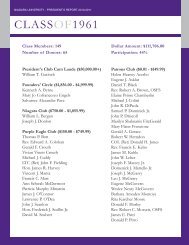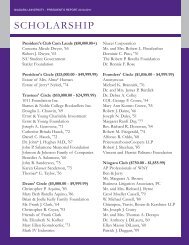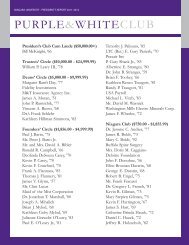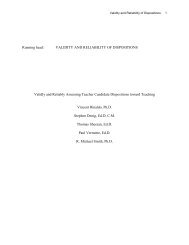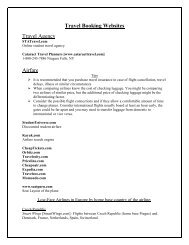Frequently Asked Questions - Niagara University
Frequently Asked Questions - Niagara University
Frequently Asked Questions - Niagara University
You also want an ePaper? Increase the reach of your titles
YUMPU automatically turns print PDFs into web optimized ePapers that Google loves.
Additionally, candidates must take and successfully complete a written examination, a physical fitness<br />
examination and a medical examination that may include drug screening. Further, before being<br />
appointed as a police officer, a person may be required to submit to a psychological examination and a<br />
background investigation. A person with a criminal conviction or with a felony conviction may be<br />
disqualified from employment.<br />
19. Can this training be used to satisfy basic police training requirements in other states?<br />
(from DCJS web site www.criminaljustice.state.ny.us)<br />
The decision to accept basic training completed in other states to satisfy basic police training<br />
requirements is made pursuant to the rules established by the state where a person is seeking<br />
appointment as a police officer, and the law enforcement agency considering that candidate.<br />
20. Is a police department or sheriff's office required to use this training?<br />
(from DCJS web site www.criminaljustice.state.ny.us)<br />
No. Pre‐employment training is an alternative to the conventional basic police training model in New<br />
York State. Law enforcement administrators decide what method of basic training best suites their<br />
individual needs.<br />
21. After a student completes this course and is appointed as a police officer, what further<br />
training is required?<br />
(from DCJS web site www.criminaljustice.state.ny.us)<br />
Within one year of appointment, a police officer must successfully complete the Basic Course for Police<br />
Officers. After being appointed by a law enforcement agency, a sworn officer who has completed the<br />
Pre‐Employment Police Basic Training Course must complete the post appointment component of the<br />
training, which includes at a minimum law enforcement skills and supervised field training. Law<br />
enforcement agencies and academies may add topics and increase the length of post appointment<br />
training to meet their individual needs.<br />
22. Are there any age restrictions for this program?<br />
There are no minimum or maximum age requirements for students.<br />
However, you should note that according to section 58 of the Civil Service Law, a candidate seeking<br />
permanent appointment to a police officer title must be twenty (20) years of age as of the date of<br />
appointment and not more than thirty‐five (35) years of age as of the date when the applicant takes the<br />
written examination.<br />
You must be 20 years old by time you graduate as a pre‐employment student. It is your responsibility to<br />
check with the hiring agency.<br />
23. What are the objectives for the NCLEA and <strong>Niagara</strong> <strong>University</strong>?<br />
1. Offer the <strong>Niagara</strong> Country Law Enforcement Academy (NCLEA) that adheres to all Division of<br />
Criminal Justice Services (DCJS) regulations to properly train Police and Sheriff officers.<br />
2. Partner with the <strong>Niagara</strong> County Sheriff’s Office and <strong>Niagara</strong> Falls Police Department to provide<br />
approved instruction for sworn recruits and pre‐employment recruits.<br />
3. Generate educational opportunities to support <strong>Niagara</strong> <strong>University</strong> and future Law Enforcement<br />
Academy operations.<br />
6 | P age





